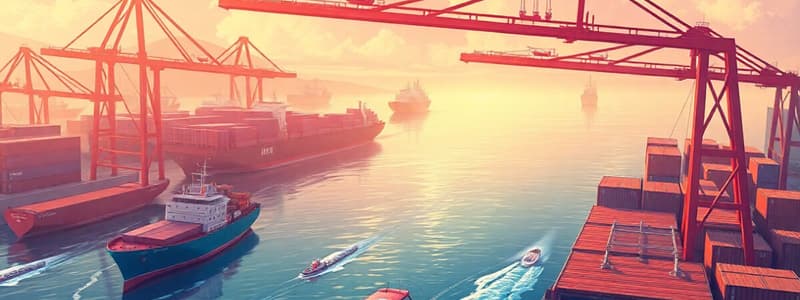Podcast
Questions and Answers
What is the primary goal of local content requirements?
What is the primary goal of local content requirements?
- To encourage imports of foreign goods
- To reduce consumer prices
- To eliminate all forms of tariffs
- To benefit domestic producers and jobs (correct)
How do administrative trade policies affect consumers?
How do administrative trade policies affect consumers?
- They reduce the cost of imported goods.
- They provide consumers with access to foreign products.
- They restrict access to potentially superior foreign products. (correct)
- They encourage competition among local businesses.
What is the purpose of antidumping policies?
What is the purpose of antidumping policies?
- To encourage dumping of domestic products
- To eliminate trade barriers altogether
- To promote foreign competition
- To protect domestic producers from unfair foreign competition (correct)
What is dumping in the context of international trade?
What is dumping in the context of international trade?
What trade barrier is commonly viewed as necessary despite its adverse effects on consumers?
What trade barrier is commonly viewed as necessary despite its adverse effects on consumers?
How do import quotas primarily benefit domestic producers?
How do import quotas primarily benefit domestic producers?
What is the main consequence of voluntary export restraints (VER) for consumers?
What is the main consequence of voluntary export restraints (VER) for consumers?
What does a local content requirement mandate?
What does a local content requirement mandate?
Which of the following best describes voluntary export restraints (VER)?
Which of the following best describes voluntary export restraints (VER)?
What effect do import quotas and voluntary export restraints (VER) have on the prices of goods?
What effect do import quotas and voluntary export restraints (VER) have on the prices of goods?
What does the term 'ad valorem' mean in the context of tariffs?
What does the term 'ad valorem' mean in the context of tariffs?
How does an ad valorem tariff affect consumers?
How does an ad valorem tariff affect consumers?
Which of the following is NOT a reason for imposing tariffs?
Which of the following is NOT a reason for imposing tariffs?
What is one of the main consequences of tariffs on consumers?
What is one of the main consequences of tariffs on consumers?
Why might tariffs be politically popular?
Why might tariffs be politically popular?
What is often a consequence of tariffs on trade said by economists?
What is often a consequence of tariffs on trade said by economists?
What is one of the primary aims of imposing tariffs?
What is one of the primary aims of imposing tariffs?
How are tariffs generally paid?
How are tariffs generally paid?
What is the primary short-term effect of tariffs on individual consumers?
What is the primary short-term effect of tariffs on individual consumers?
In the long term, how can tariffs affect businesses?
In the long term, how can tariffs affect businesses?
What is a likely effect of tariffs on government revenue in the short run?
What is a likely effect of tariffs on government revenue in the short run?
What outcome occurs when the price of goods increases due to tariffs?
What outcome occurs when the price of goods increases due to tariffs?
How do tariffs potentially affect inflation in an economy?
How do tariffs potentially affect inflation in an economy?
What is one reason consumers may be negatively impacted by tariffs?
What is one reason consumers may be negatively impacted by tariffs?
What is the relationship between tariffs and domestic market competition?
What is the relationship between tariffs and domestic market competition?
What might happen to consumers' purchasing power as a result of tariffs?
What might happen to consumers' purchasing power as a result of tariffs?
What is one direct impact of tariffs on domestic importers?
What is one direct impact of tariffs on domestic importers?
What is a primary reason for the decline in the role of tariffs in modern trade?
What is a primary reason for the decline in the role of tariffs in modern trade?
Which of the following best describes a subsidy?
Which of the following best describes a subsidy?
How do non-tariff barriers affect consumer prices?
How do non-tariff barriers affect consumer prices?
What is an import quota?
What is an import quota?
What is the relationship between tariffs and inflation?
What is the relationship between tariffs and inflation?
What role does the World Trade Organization play regarding tariffs?
What role does the World Trade Organization play regarding tariffs?
What is the main purpose of implementing tariffs in international trade?
What is the main purpose of implementing tariffs in international trade?
What is one effect of domestic producers receiving subsidies?
What is one effect of domestic producers receiving subsidies?
Which of the following best describes a specific tariff?
Which of the following best describes a specific tariff?
What could be a potential negative effect of imposing a tariff on imported goods?
What could be a potential negative effect of imposing a tariff on imported goods?
What is an advantage of using nontariff trade barriers compared to tariffs?
What is an advantage of using nontariff trade barriers compared to tariffs?
Which instrument of trade policy is designed to control the volume of imports?
Which instrument of trade policy is designed to control the volume of imports?
What is the key distinction between ad valorem tariffs and specific tariffs?
What is the key distinction between ad valorem tariffs and specific tariffs?
Which of the following is NOT considered an instrument of trade policy?
Which of the following is NOT considered an instrument of trade policy?
In which way do voluntary export restraints limit trade?
In which way do voluntary export restraints limit trade?
Flashcards
Tariff
Tariff
A tax imposed by a government on imported goods.
Subsidy
Subsidy
Government payment to domestic producers, helping them compete with foreign imports.
World Trade Organization (WTO)
World Trade Organization (WTO)
International organizations aimed at promoting free trade, reducing tariffs and trade barriers.
License
License
Signup and view all the flashcards
Import Quota
Import Quota
Signup and view all the flashcards
Production Distortion
Production Distortion
Signup and view all the flashcards
Consumption Distortion
Consumption Distortion
Signup and view all the flashcards
Non-Tariff Barriers
Non-Tariff Barriers
Signup and view all the flashcards
Ad valorem tariff
Ad valorem tariff
Signup and view all the flashcards
Tariffs and domestic producers
Tariffs and domestic producers
Signup and view all the flashcards
Tariffs and consumers
Tariffs and consumers
Signup and view all the flashcards
Tariffs and global efficiency
Tariffs and global efficiency
Signup and view all the flashcards
Tariffs and infant industries
Tariffs and infant industries
Signup and view all the flashcards
Comparative advantage
Comparative advantage
Signup and view all the flashcards
Tariffs and domestic employment
Tariffs and domestic employment
Signup and view all the flashcards
Free Trade
Free Trade
Signup and view all the flashcards
Trade Policy
Trade Policy
Signup and view all the flashcards
Specific Tariff
Specific Tariff
Signup and view all the flashcards
Voluntary Export Restraint (VER)
Voluntary Export Restraint (VER)
Signup and view all the flashcards
Local Content Requirement
Local Content Requirement
Signup and view all the flashcards
Administrative Trade Policies
Administrative Trade Policies
Signup and view all the flashcards
Dumping
Dumping
Signup and view all the flashcards
Antidumping Policies
Antidumping Policies
Signup and view all the flashcards
Antidumping Duties
Antidumping Duties
Signup and view all the flashcards
Non-Tariff Barriers to Trade
Non-Tariff Barriers to Trade
Signup and view all the flashcards
Impact of Quotas and VERs on Prices
Impact of Quotas and VERs on Prices
Signup and view all the flashcards
How do tariffs affect prices?
How do tariffs affect prices?
Signup and view all the flashcards
How do tariffs affect businesses?
How do tariffs affect businesses?
Signup and view all the flashcards
Do tariffs cause inflation?
Do tariffs cause inflation?
Signup and view all the flashcards
How do tariffs affect businesses and governments over time?
How do tariffs affect businesses and governments over time?
Signup and view all the flashcards
How do tariffs affect the government in the long term?
How do tariffs affect the government in the long term?
Signup and view all the flashcards
Who benefits from tariffs?
Who benefits from tariffs?
Signup and view all the flashcards
What are the effects of tariffs and trade barriers?
What are the effects of tariffs and trade barriers?
Signup and view all the flashcards
How does a tariff impact the domestic market?
How does a tariff impact the domestic market?
Signup and view all the flashcards
Study Notes
International Trade Policy
- Free trade is a situation where governments don't restrict what citizens can buy or sell to other countries.
- Governments often intervene in international trade to protect politically important groups.
- There are seven main instruments of trade policy: tariffs, subsidies, import quotas, voluntary export restraints, local content requirements, antidumping policies, and administrative policies.
Tariffs
- A tariff is a tax on imports, increasing the cost of imported goods relative to domestic products.
- A specific tariff is a fixed fee per unit of imported goods. The amount can vary based on the type of good.
- An ad valorem tariff is levied as a percentage of the imported good's value. For example, a 15% tariff on US automobiles imported to Japan would add $1500 to the cost of a $10,000 vehicle.
- Tariffs benefit domestic producers by reducing competition but harm domestic consumers with higher prices for goods.
- Tariffs increase government revenue but reduce overall economic efficiency.
- Tariffs are used to protect domestic employment, protect consumers from a specific risk, protect infant industries, for national security, and as retaliation for unfair trade practices.
Nontariff Trade Barriers
- Subsidies: Government payments to domestic producers help them compete against cheaper imports and potentially gain export markets. Consumers generally absorb the cost of subsidies.
- Licenses: The government grants licenses to businesses to import specific goods. This can limit competition and raise prices for consumers.
- Import quotas: A restriction on the quantity of an imported good. Import quotas help domestic producers by reducing import competition, but they raise prices of imported goods.
- Voluntary export restraints (VERs): A trade barrier implemented voluntarily by an exporting country, often at the request of an importing country. This limits import competition, increasing prices for consumers while benefiting domestic producers.
- Local Content Requirements: Rather than a quota on imported goods, the government may require a certain percentage of a good's production or value to be domestic. This helps boost domestic industries but raises consumer prices.
- Administrative policies: Bureaucratic rules make imports difficult, such as specific regulations or quality standards, hurting consumers by denying access to potentially cheaper or better foreign goods.
- Dumping: Selling goods below their production cost in a foreign market to drive competitors out of that market. This may be seen as unfair competition.
- Antidumping policies: Punish foreign firms engaging in dumping. These can involve antidumping duties or countervailing duties.
Studying That Suits You
Use AI to generate personalized quizzes and flashcards to suit your learning preferences.




